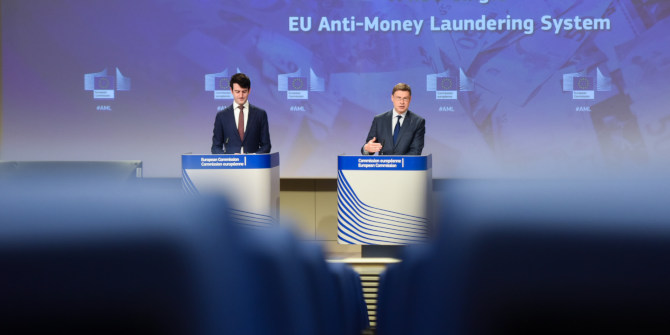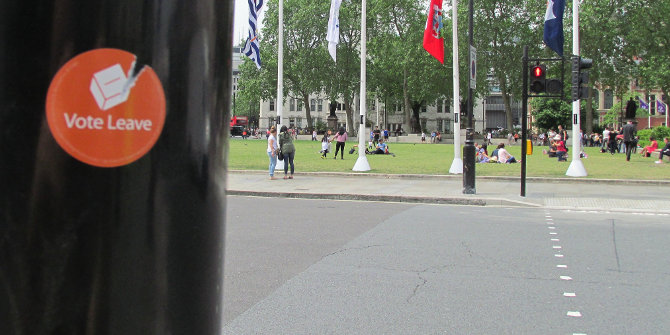The EU responded to the COVID-19 pandemic with an unprecedented set of measures, including its Next Generation EU recovery package. Gianmarco Fifi examines what the EU’s response can tell us about crisis management.
Scholars of political economy have often seen crises as periods during which policymakers learn from previous mistakes and adapt policies accordingly. The European response to the COVID-19 pandemic represents an interesting example of such reasoning.
Both the academic literature and the broader public debate seem to agree that the management of the pandemic by the EU was prompter and more successful compared to what had happened during previous crises. This assessment has been justified mainly by the fact that solidarity between member states prevailed as opposed to the strict conditionality that had characterised the post-Eurozone crisis period.
In particular, the Next Generation EU initiative launched to foster the recovery is seen as a prompt and apt response to the challenges posed by the pandemic. On the other hand, little attention has been dedicated to the direction towards which Next Generation EU funds are allocated.
The symmetry of the crisis-shock explains the insurance mechanisms put in place during the most severe period of COVID-19 spread (for instance through the SURE programme aimed at reducing the effects of unemployment due to business closures) and provides insights on the long-term commitment to redistribute in favour of the countries hardest hit, insuring them against budget risks. On the other hand, this does not give us an equally straightforward interpretation of the spending-focus of Next Generation EU (in particular, the funds dedicated to the green and digital transition).
In a new study, I trace the development of EU ideas between the Eurozone crisis and the COVID-19 pandemic. I highlight how Next Generation EU, rather than acting as a response to a specific crisis period, was the result of pre-conceived priorities surrounding the need to foster climate policies. At the theoretical level, I argue that exogenous shocks (crises that are not easily associated with any institutional deficiency) tend to leave policymakers leeway to reinforce their previous commitments.
The EU Green Deal between the Eurozone crisis and the pandemic
The Eurozone crisis of 2010 was tackled through the “moral hazard paradigm”, according to which member states were deemed fully responsible for the soundness of their own budget balance. During the recovery, austerity programmes were increasingly criticised, and Europe experienced growing support for Keynesian policies.
A case in point is the emphasis placed by the Juncker Commission (2014-2019) on growth and employment. The appointment of the Commission led by Ursula von der Leyen in December 2019 represented an additional step in the EU shift away from austerity, adding new and ambitious plans to tackle climate change. This was a clear break from the previous European approach, which instead of setting specific environmental goals, subordinated climate policies to growth and investments.
Promising an “economy that works for people”, von der Leyen was de facto inverting the ranking of EU priorities. Presenting the new Commission, she argued:
“At the heart of our work is the need to address the changes in climate, technology and demography that are transforming our societies and way of life… The EU must lead the transition to a healthy planet and a new digital world.”
The need to promote “the European way of life” (of which the EU Green Deal was now a cornerstone) was constantly referenced during the debates over the post-pandemic recovery plan. Such an approach was developed by the new Commission before the COVID-19 outbreak, and the crisis was then exploited as an opportunity to push such priorities forward.
COVID-19 as a reinforcing mechanism for the green transition
The post-pandemic response at the EU level was linked to a push towards rethinking economic policymaking more broadly and particularly to fulfil the ambition inherent in the EU Green Deal. The EU thus saw the recovery from the pandemic as an opportunity to “relaunch and transform our economies”. It is in this spirit that the former President of the Commission, Jean-Claude Juncker, predicted that “after the crisis we will be better Europeans”.
The implementation of the recovery plan at the EU level involved harsh discussions on how to fund the plan and on the extent to which Next Generation EU had to be based on grants as opposed to loans. On the other hand, even the most hawkish positions represented by the “Frugal Four” coalition (Austria, Denmark, the Netherlands and Sweden) never questioned the overarching purpose of the plan, i.e. the need to reinforce previous climate commitments.
My research shows that key actors at the European level saw a strict link between the European Green Deal, formulated and agreed upon before the outbreak of the pandemic, and Next Generation EU. The main issues to be tackled were identified independently from the crisis and were agreed upon by both major coalitions characterising the recovery debate – i.e. by the Frugal Four and southern countries.
On the other hand, the peak of COVID-19 (April 2020) allowed for convergence to emerge around the instruments to be employed, which ultimately facilitated the launch of Next Generation EU. The crisis was thus interpreted as an opportunity to strengthen the strategic agenda presented by the European Council for the period of 2019–2024, which already focused on building a “climate neutral, green, fair and social Europe”.
This is further proven by the fact that the adjusted commission work programme published in 2020 looked very much like an expanded copy of the original work programme published in 2019. The pandemic was considered the epitome of an exogenous shock, to which no clear long-term policy response could be given, if not one that reinforced previous political economic plans.
In conclusion, focusing on the spending realms of Next Generation EU helps us highlight the inherent ambiguity of post-pandemic crisis-management. Furthermore, it reminds us that crises do not always specify a clear “direction” towards which policymakers should look for solutions. This is a lesson that might be particularly relevant as the EU faces the challenges of a polycrisis world.
For more information, see the author’s accompanying paper in the Journal of European Public Policy
Note: This article gives the views of the author, not the position of EUROPP – European Politics and Policy or the London School of Economics. Featured image credit: © European Union, 2021 (CC BY 4.0)





